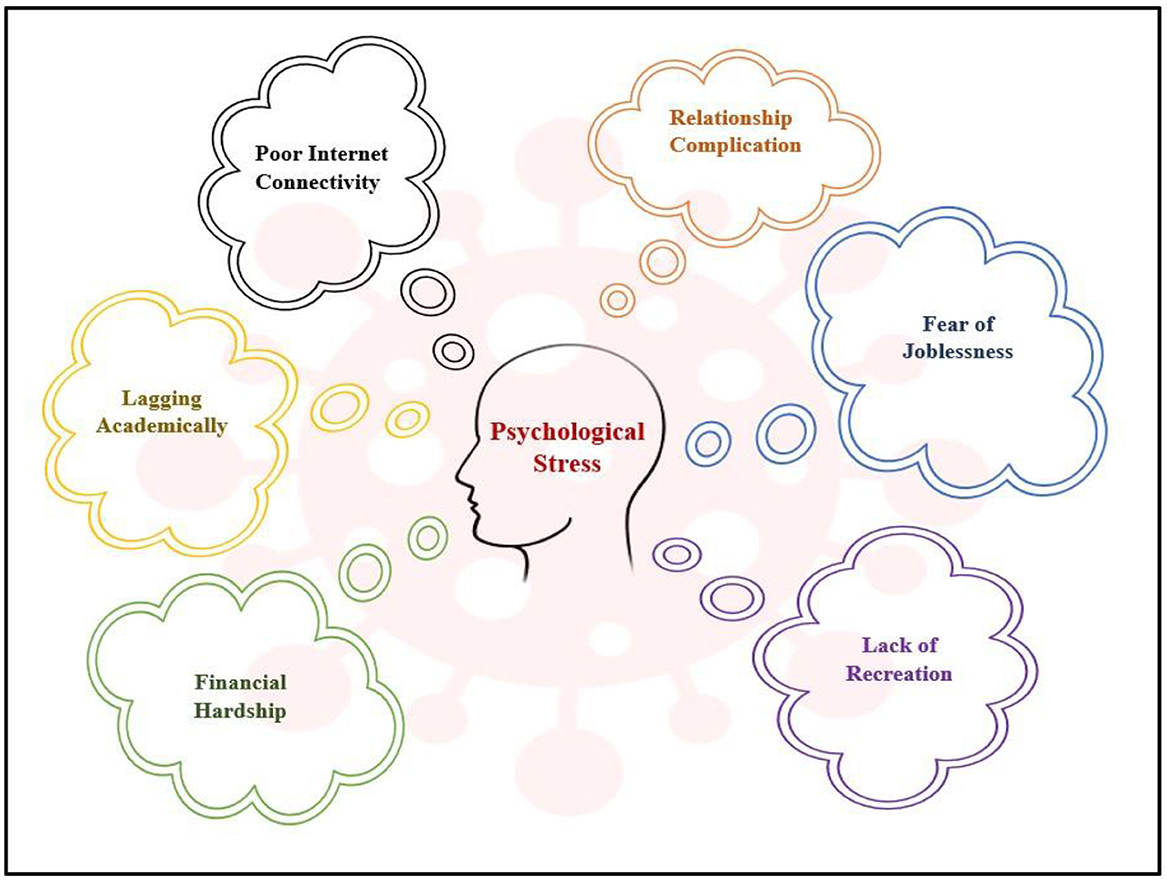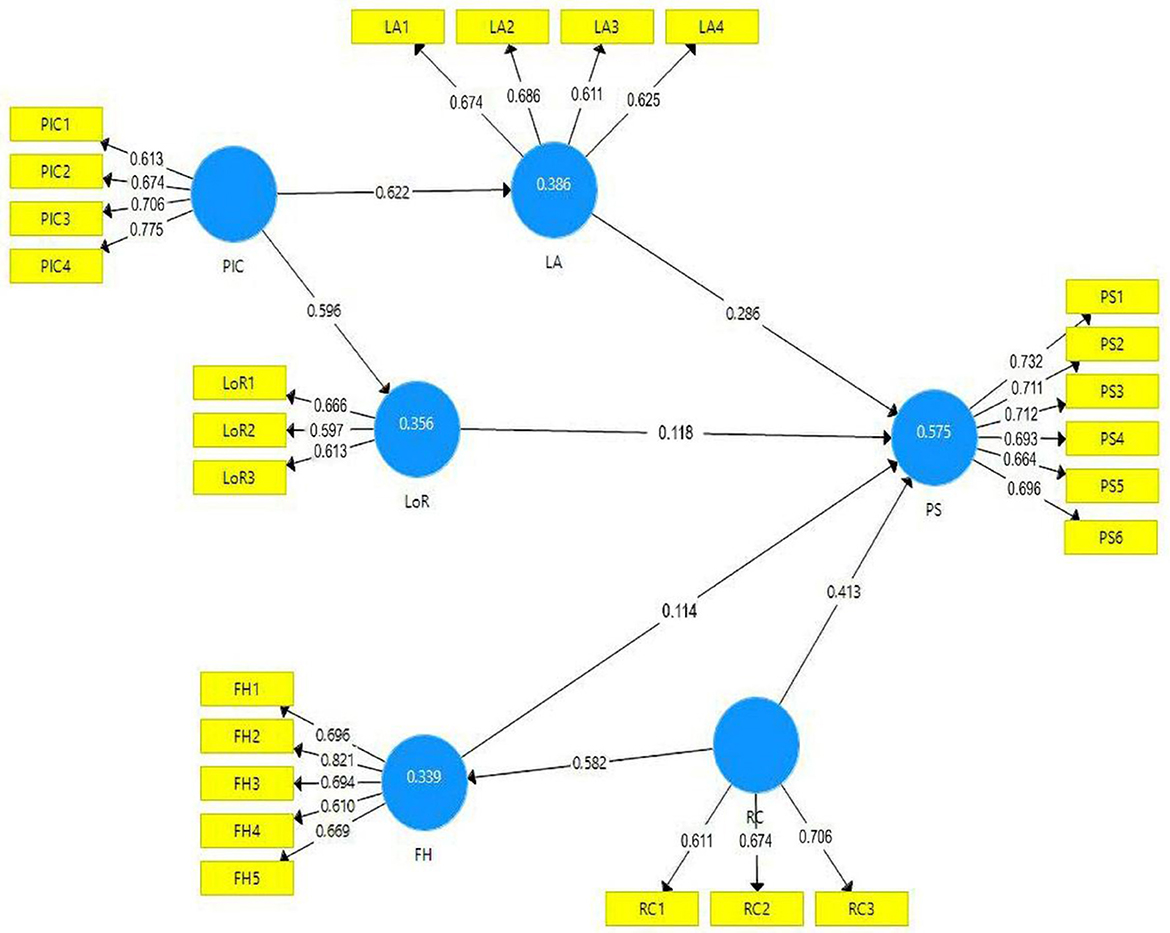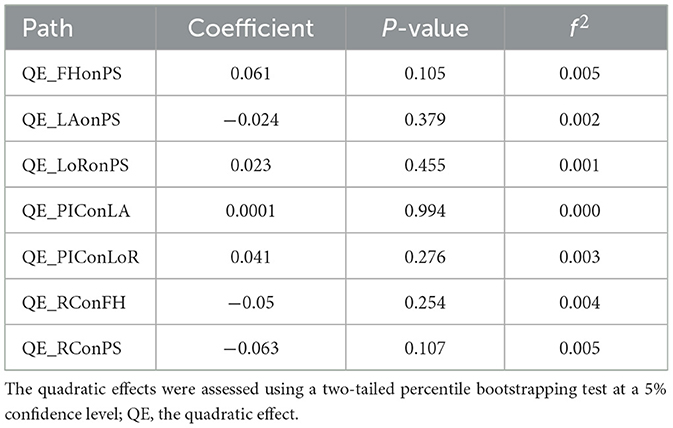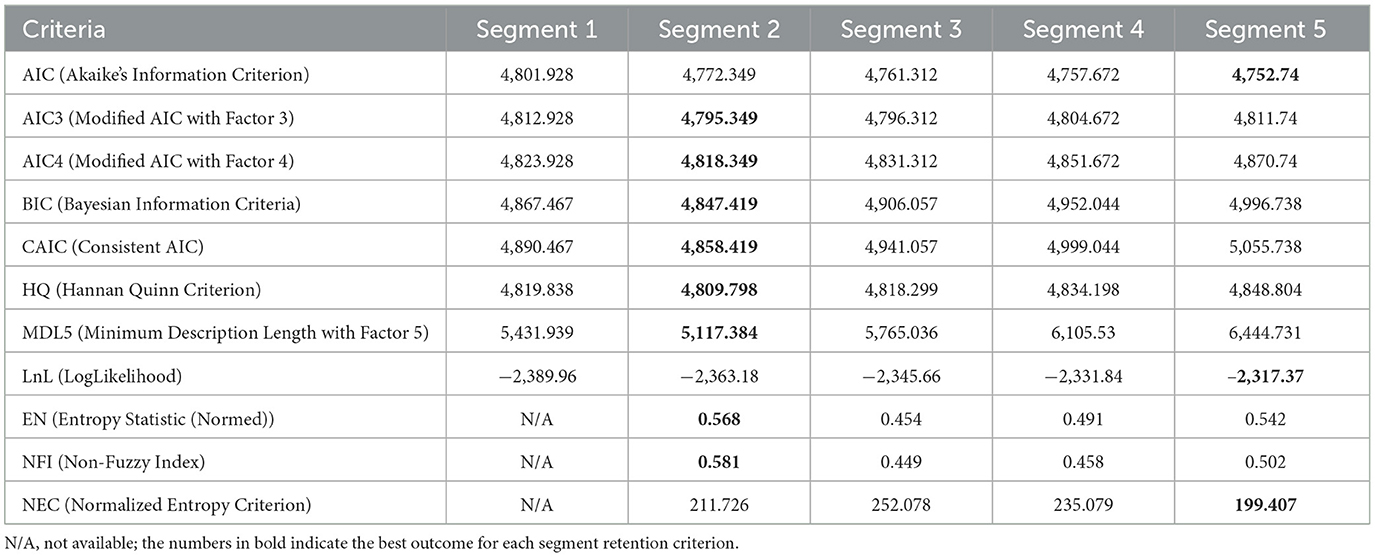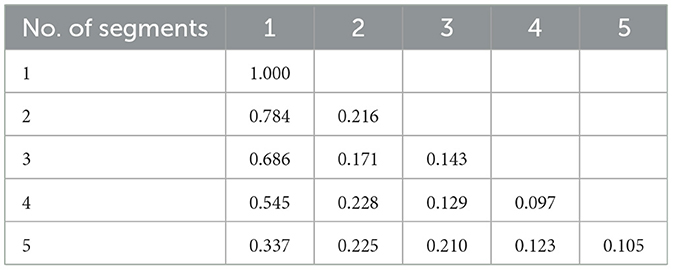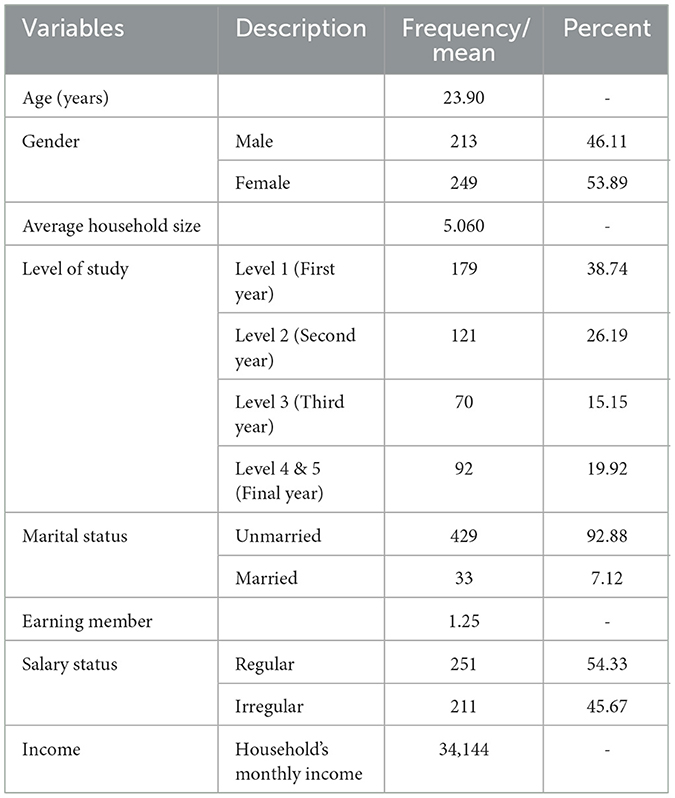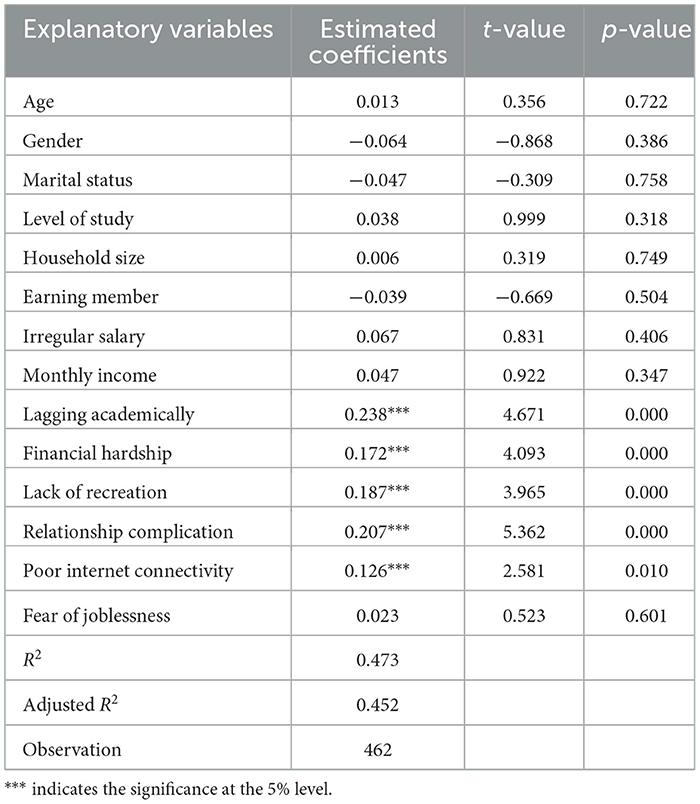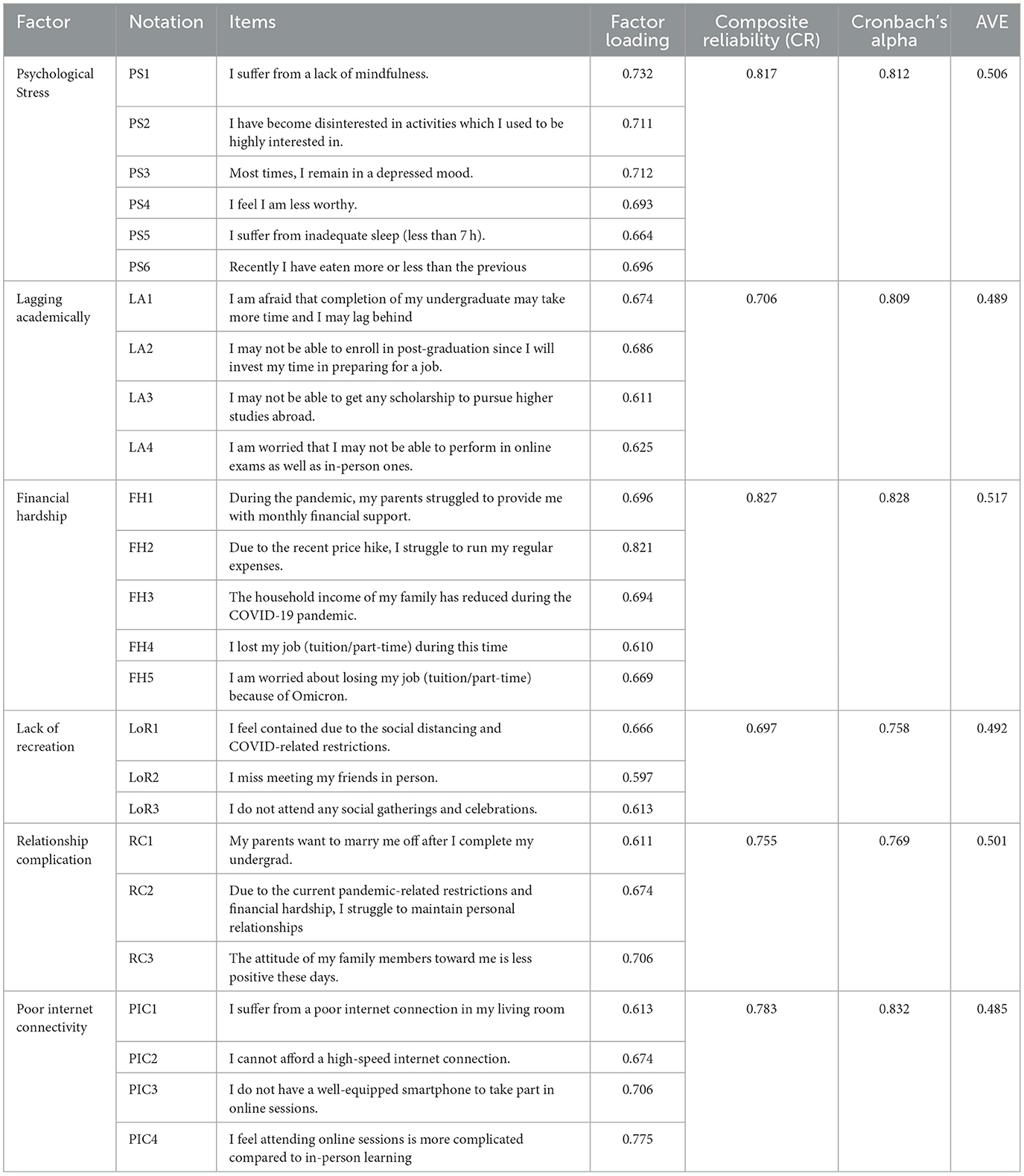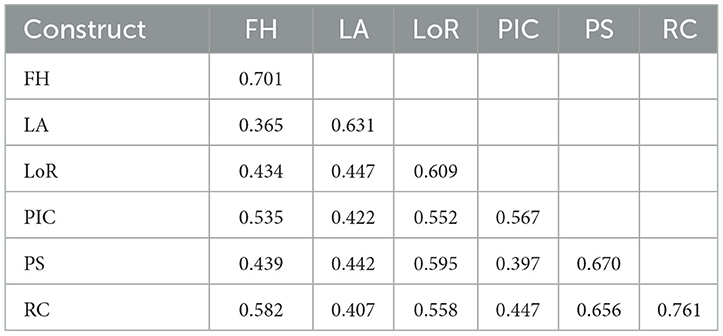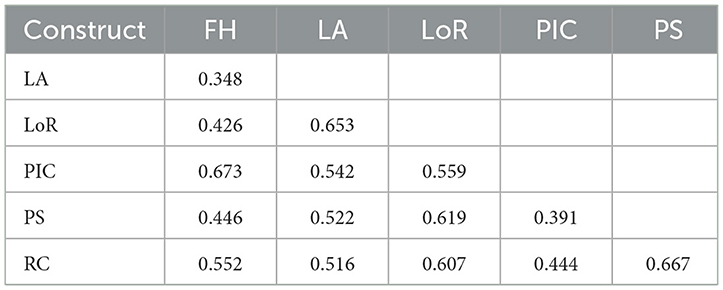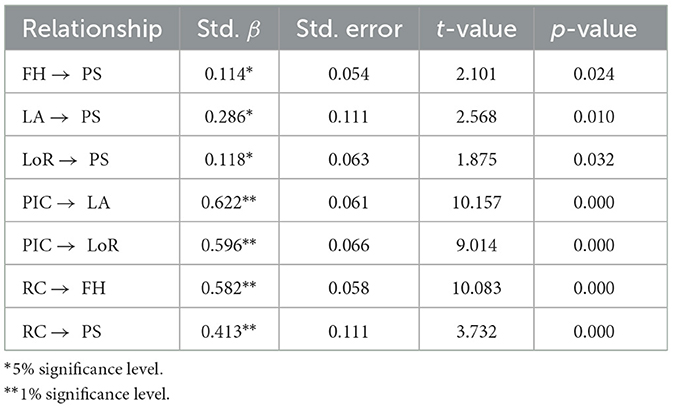- 1Department of Agricultural Economics, Bangladesh Agricultural University, Mymensingh, Bangladesh
- 2Centre for Peace and Security, Coventry University, Coventry, United Kingdom
- 3Department of Food and Resource Economics, University of Florida, Gainesville, FL, United States
- 4Department of Economics, North South University, Dhaka, Bangladesh
- 5Department of Agribusiness and Marketing, Bangladesh Agricultural University, Mymensingh, Bangladesh
- 6Department of Agricultural Economics and Agribusiness, University of Arkansas, Fayetteville, AR, United States
Introduction: The COVID-19 pandemic has had profound impacts on multiple aspects of human life, including public health, economic stability, and education systems worldwide. During the Omicron variant-led wave, Bangladeshi university students faced significant disruptions, such as delays in graduation and limited opportunities for income-generating activities. This study offers a new attempt to investigate the psychological stress experienced by Bangladeshi university students and the sources of that stress.
Methods: A cross-sectional study was conducted using multiple linear regression analysis and Partial Least Squares Structural Equation Modeling (PLS-SEM). Socioeconomic and psychological characteristics were included as independent variables to assess their relationship with psychological stress.
Results: The findings reveal that relationship issues, scholastic delays, lack of recreation, and poor internet connectivity are significant contributors to psychological stress among university students. Relationship complications emerged as the strongest predictor (β= 0.413, p < 0.001), followed by scholastic delays (β= 0.286, p = 0.010), lack of recreation (β= 0.118, p = 0.032), and poor family harmony (β= 0.114, p = 0.024).
Discussion: This study represents one of the first systematic efforts to examine the psychological stressors of university students in Bangladesh. The results highlight the multidimensional nature of student stress and emphasize the urgent need for targeted interventions from both governmental and non-governmental organizations. The insights also have broader implications for understanding student mental health in other developing countries facing similar socioeconomic and infrastructural constraints.
1 Introduction
While the COVID-19 infection rate has dropped and the world has entered the “new normal”, the far-reaching consequences of the pandemic are here to stay. The unprecedented COVID-19 pandemic wreaked havoc on every aspect of human life, killing millions and crippling the economy, healthcare system, and education, among other sectors (Snooks, 2020). The world has experienced several waves of COVID-19 since the World Health Organization declared it a pandemic (Cucinotta and Vanelli, 2020). Although we have escaped from the worst of COVID-19-related misery, the latest wave, driven by the Omicron variant wave, has caused widespread disruption globally. Many scientists believe the Omicron variant is more infectious (Arora et al., 2022), raising global concern. Despite efforts to contain the Omicron variant's spread, including mass vaccination programs, people from all walks of life faced terrible suffering. The toll of the Omicron variant was particularly severe on the global economy, healthcare, education, and more. Tragically, people in developing countries endured intolerable suffering as they struggled to meet their basic needs.
Indeed, educational institutions suffered one of the most severe setbacks worldwide, particularly in developing countries like Bangladesh (Alam, 2021). This is due to a lack of logistics and technical support, which made it difficult to maintain the educational sector. On average, the COVID-19 pandemic forced educational institutions to defer at least one academic year, leaving students behind in their academic progress. The Omicron variant outbreak resulted in the closure of educational institutions once more. Notably, the Bangladeshi government decided to reopen institutions after a 465-day closure. However, the rise in Omicron cases led to another prolonged closure. Millions of students' dreams of a smooth and uninterrupted education were shattered as they struggled to adapt. University students, in particular, were subjected to the most severe disruption, as concerns about completing their studies and entering the workforce grew.
University students faced significant challenges as their graduation process was delayed and potential job opportunities shrunk due to the economic downturn, both domestically and internationally (Rasul et al., 2021). Prolonged university closures could also lead to severe mental stress, as many students struggle to make productive use of their valuable time. Furthermore, female students have been disproportionately affected, as many face family pressure to marry (Iqbal et al., 2021). The pandemic‘s impact has been felt across all demographics- people of every age and class have acknowledged its disruptive effects. What makes university students unique in the crisis is that they are caught in a situation where their graduation is delayed, and many cannot engage in income-earning activities as the economy of Bangladesh faces significant losses, leading to fewer employment opportunities (Shahriar et al., 2021). Many students also experienced severe psychological distress amid growing financial hardships within their families due to the pandemic-induced economic downturn. University students are the future of a nation, and delays in their graduation could leave them mentally devastated. It is reported that class closures and psychological stress are inextricably linked. Although the situation got worsened, the exact extent in Bangladesh is not fully understood. Therefore, this study is a novel effort to explore the psychological stress experienced by university students in Bangladesh and identify the factors that contribute to that stress.
A range of social, financial, political, mental, academic, and livelihood-related factors affect the psychological wellbeing of university students. Although universities provide some support services, many students continue to face heavy academic workloads, depression, and stress—problems that intensified globally during the COVID-19 pandemic (Islam et al., 2020; Laar et al., 2021; Lu et al., 2022; Schwartz et al., 2021; Yang et al., 2021). This growing concern has attracted substantial scholarly attention, with diverse frameworks used to examine student wellbeing. Burns et al. (2020) highlighted a conceptual shift prior to the pandemic, emphasizing dynamic interactions in wellbeing that extend beyond health alone. Among these approaches the PERMA model (Positive Emotion, Engagement, Relationships, Meaning, and Accomplishment); (Seligman, 2012), rooted in positive psychology (Burns et al., 2020; Seligman, 2018), remains one of the most widely applied. Building on these concepts, the present study develops a framework incorporating six latent factors to examine the psychological stress of university students in Bangladesh during the third wave of the COVID-19 pandemic, driven by the Omicron variant.
Financial hardship was a major challenge, particularly in low- and middle-income countries where the pandemic disrupted both academic and social activities. In India, 26.5% of undergraduate and graduate students living away from home reported financial difficulties (Kapasia et al., 2020), with similar evidence from the Philippines (Barrot et al., 2021) and Pakistan (Ali et al., 2020). In Bangladesh, 79% of tertiary students faced pandemic-induced financial crises (Hosen et al., 2022), with public university students particularly vulnerable (Shafiq et al., 2021), often due to the loss of part-time jobs and other income sources. Financial instability not only affected students' ability to pay tuition and access learning tools but also heightened uncertainty about their future prospects. Academic delay emerged as another significant stressor. With in-person classes suspended, universities shifted to online learning, however, many institutions in developing countries lacked the necessary resources, infrastructure, and efficiency (Tadesse and Muluye, 2020). Prolonged closures, delayed or canceled examinations, limited access to online platforms, and health-related disruptions further hindered student performance (Dutta and Smita, 2020; Yang et al., 2021). In Bangladesh, many students were unable to participate in assessments or advance academically, while several departments failed to conduct semester-end examinations online (Hosen et al., 2022). This prolonged uncertainty created frustration, lowered motivation, and worsened psychological distress. Poor internet access compounded these difficulties, restricting students' ability to engage in online learning. Internet services in Bangladesh have long been criticized for high costs, slow speeds, and unequal distribution (Islam and Inan, 2021). Many students also struggled with inadequate devices, limited access, and insufficient digital skills (Dutta and Smita, 2020), which hindered participation and deepened feelings of exclusion and helplessness. Relationship complications constituted another critical factor. Relationships with peers, family, and the wider community are essential for student wellbeing, particularly during crises. Elmer et al. (2020) found that COVID-19-related concerns, isolation, reduced interaction, and limited support increased mental health problems among Swiss undergraduates. Although underexplored in Bangladesh, experiential evidence suggests similar challenges, with students reported loneliness, weakened social bonds, and loss of emotional support networks, which intensified stress and vulnerability. Fear of joblessness further exacerbated student stress, especially in Bangladesh, where graduate unemployment was already a pressing issue before the pandemic. Economic disruptions and hiring freezes heightened anxieties about delayed graduation and limited employment opportunities, particularly for financially insecure students, contributed to persistent psychological strain. Finally, lack of recreation contributed significantly to student‘s stress. Recreational activities are essential for maintaining wellbeing, yet closure of campuses, hostels, and facilities removed key outlets for relaxation and socialization. Many students turned to social media for engagement, but problematic use was associated with higher anxiety and depression among Bangladeshi university students (Islam et al., 2021). Similarly, limited recreational opportunities was linked to stress, depression, and post-traumatic symptoms among quarantined students. The absence of healthy leisure avenues, therefore, represents an important yet often overlooked factor in declining student mental health.
Although a growing body of literature has examined student mental health during the COVID-19 pandemic across different countries, research focusing specifically on Bangladeshi university students remains limited, despite their heightened vulnerability. These students faced unique challenges, including prolonged university closures, limited online infrastructure, financial hardship, and an intensely competitive job market, that collectively placed them at greater risk than many of their global peers. The pandemic disrupted academic progress, delayed graduation, and, postponed entry into professional careers, with long-term consequences for both individual livelihoods and the broader labor market. Yet, despite these pressing concerns, comprehensive frameworks that systematically examine the multifaceted drivers of psychological stress among Bangladeshi students are still lacking.
Existing studies provide important insights but remain fragmented. For example, Dutta and Smita (2020) highlighted how inadequate learning materials and unfavorable home environments reduced study motivation, alongside rising health problems and employment uncertainty. Faisal et al. (2022) reported that nearly three-quarters of students showed depressive symptoms and more than half suffered from poor psychological health, while Dhar et al. (2020) revealed that 97% experienced anxiety linked to financial hardship and academic delays. Similarly, Al Mamun et al. (2021) documented pandemic-induced psychological disorders across different groups, and Islam et al. (2020) identified widespread sleep disturbances among students. While these findings are valuable, they largely addressed isolated aspects of stress rather than integrating the broader social, economic, and academic dimensions into a cohesive explanatory framework.
Against this backdrop, the present study makes two important contributions. First, it develops a conceptual framework built around six latent factors to systematically explain the drivers of psychological stress among university students in Bangladesh. This framework advances beyond fragmented analyses by linking these factors to Seligman's PERMA model of wellbeing, thereby offering a more comprehensive understanding of student stress in crisis contexts. Second, by focusing on Bangladeshi university students during the third wave of the pandemic, the study provides context-specific insights that enrich academic discourse while offering practical value for policy and institutional interventions. The findings have direct implications for designing targeted mental health support programs, improving resource allocation for digital learning, and formulating employment-oriented policies to safeguard both the wellbeing and future prospects of students in Bangladesh.
1.1 Conceptual framework
Drawing on the literature and contextual evidence from Bangladesh, this study identifies six interrelated factors that significantly influenced the psychological wellbeing of university students during the COVID-19 pandemic: financial hardship, academic delay, poor internet access, relationship complications, fear of joblessness, and lack of recreation (Figure 1). These factors corresponding to the five components of Seligman's PERMA model, as each reflects disruptions to positive emotions, engagement, relationships, meaning, and accomplishment. The cumulative impact of these stressors created sustained pressures, manifested as heightened anxiety, depression, and uncertainty among students, particularly those in public universities. While research has examined some of these dimensions individually, a comprehensive framework linking all six factors to student wellbeing in the Bangladeshi context remains limited. By positioning these concerns within a conceptual model, this study aims to deepen understanding of pandemic-induced psychological stress and generate insights with practical implications for both research and policy. In developing the conceptual path model (Figure 2), direct links were specified only where prior studies indicated strong theoretical or empirical associations with psychological stress. We acknowledge that additional relationships, such as financial hardship affecting recreation or internet access, are also plausible (Luong et al., 2018). However, these paths were not included in the current model to maintain parsimony and focus on the most central hypothesized drivers of stress. Future research could expand the framework to incorporate such pathways and evaluate their relevance in broader contexts.
Based on this framework, the study tested the following hypotheses:
Hypothesis 1: Financial Hardship (FH) is positively correlated with Psychological Stress (PS) (FH → PS).
Hypothesis 2: Lagging Academically (LA) is positively related to PS.
Hypothesis 3: Lack of Recreation (LoR) positively affects PS.
Hypothesis 4: Relationship Complications (RC) positively impact PS.
Hypothesis 5: Poor Internet Connectivity (PIC) is positively correlated with PS.
Hypothesis 6: Fear of Joblessness (FoJ) positively affects PS.
2 Materials and methods
2.1 Study design and setting
This research adopted a cross-sectional design and was conducted using a web-based questionnaire disseminated via Google Forms. The survey was distributed through official university channels, including email and social media study groups. Data collection took place during the third wave of the COVID-19 pandemic in Bangladesh, when the Omicron variant was spreading rapidly nationwide (Rahman, 2022).
2.2 Study sample and sampling
The target population consisted of undergraduate students from two major agricultural universities in Bangladesh:
• Bangladesh Agricultural University (BAU) and
• Bangabandhu Sheikh Mujibur Rahman Agricultural University (BSMRAU).
A total of 513 students initially participated. After excluding 19 respondents due to missing or illogical data, 494 valid responses were retained for analysis. Of these, 52% were female and 48% male, with an average age of approximately 24 years. To encourage participation, one randomly selected respondent received a token gift.
2.3 Measurement tools
A compact and structured questionnaire was designed to guide data collection. The survey instrument comprised ten sections covering:
• Socio-economic characteristics (age, sex, education, household size, monthly income).
• COVID-19 vaccination status.
• Impacts of COVID-19 on mental health, including anxiety about job prospects, academic lag, and lack of recreation.
The questionnaire was developed through a literature review, followed by informal discussions with experts, teachers, and researchers. Responses were measured using a five-point Likert scale (1 = strongly disagree, 5 = strongly agree), following Rezaei et al. (2020).
2.4 Data collection
Data were collected entirely online due to pandemic restrictions via Google Forms through various official channels of the university, including email and social media-based online study groups. Data collection took place during the third wave of the coronavirus pandemic in Bangladesh when the Omicron variant was spreading rapidly and COVID-19 infections were rising nationwide (Rahman, 2022). The online survey was conducted from February 8 to February 24, 2022. This period coincided with the final evaluation phase of university courses, making it an appropriate time to conduct the study. During this time, students were able to reflect on the unusual academic year and evaluate their courses in-depth as well as assess the potential effects of the third wave. Due to the disruptions and uncertainty caused by the pandemic, university students worldwide experienced increased anxiety about their future job placements (Campoverde and Tornero, 2021). Before participation, students provided informed consent through the survey platform. The online mode ensured safety, accessibility, and broad reach among the student population.
2.5 Pathway design
The conceptual pathway of this study was designed to examine the psychological stress of students and its associated factors. Drawing on prior research, we hypothesized that financial hardship, academic lag, lack of recreation, relationship complications, poor internet connectivity, and fear of joblessness contribute significantly to psychological stress. This pathway was structured based on the combined evidence from ElTohamy et al. (2022), Islam and Inan (2021), Khan et al. (2020), van der Heide et al. (2020), Azlan et al. (2020), and Liu et al. (2021).
2.6 Statistical analysis
Structural equation modeling (SEM) is a powerful multivariate analytical technique that helps identify underlying constructs and their relationships from observational data. This approach is used to test the hypotheses of the study. There are two main types of SEM techniques—variance-based and covariance-based (CB). The Partial Least Squares (PLS) component-based algorithm is a widely used software application employed in several multi-disciplinary studies. While CB-SEM is more confirmatory, variance-based SEM (PLS-SEM) is more flexible, accommodating assumptions related to sample size, data normality, and the number of indicators. The study follows the two-step approach proposed by Anderson and Gerbing (1988). First, the measurement model is evaluated through reliability and validity analysis. Next, the structural model is analyzed by estimating path coefficients and assessing the significance of the path relationships. SmartPLS version 3.2.4 was used to evaluate the significance of factor loadings and path coefficients. To ensure robustness, we first conducted multiple linear regression as a preliminary step before applying for PLS-SEM. This provided an initial assessment of the relative influence of psychological and socio-demographic factors on psychological stress and confirmed that all selected predictors had substantial effects on the dependent variable, justifying their inclusion in the structural model.
Findings from both approaches were largely consistent: financial hardship, academic lagging, lack of recreation, and relationship complications significantly influenced psychological stress. The only divergence concerned poor internet activity, which was significant in the regression analysis but not modeled as a direct predictor in PLS-SEM due to a lack of theoretical justification. Instead, PLS-SEM revealed its indirect influence through academic lagging and lack of recreation. The consistency across methods strengthens the robustness and validity of our findings.
2.7 Robustness checks in PLS-SEM
The dataset for this study was initially examined using the observational method (mean ± 3 standard deviations) to identify any extreme observations or outliers. No such outliers were detected.
The robustness check in PLS-SEM is outlined below.
2.7.1 Non-linear effects
To determine whether significant nonlinear relationships exist between constructs, this study employed a two-stage approach to measure quadratic effects. This two-stage approach was initially suggested by Chin et al. (2003).
In the first stage, the main effect PLS path model was run to obtain estimates for the latent variable scores. These scores were then calculated and saved for further analysis.
In the second stage, a quadratic term was created as the element-wise product of the latent variable scores of the exogenous variable. The latent variable scores, along with the quadratic terms, were used as independent variables in a multiple linear regression model to explain the latent variable scores of the endogenous variable.
As shown in Table 1, all the quadratic effects were found to be insignificant, indicating that there is no significant non-linear relationship between the constructs. The effect size of the quadratic effect (f2) also yielded similar results.
2.7.2 Unobserved heterogeneity
To assess the unobserved heterogeneity, the FIMIX-PLS procedure was applied to the data. The minimum sample size required to estimate each segment was first calculated to determine the maximum number of segments to extract. For this study, the minimum sample size for PLS-SEM was found to be 70.
Thus, the data were divided into four segments. Both AIC3 and CAIC indicated the same number of segments. According to Sarstedt et al. (2011), when AIC3 and CAIC suggest the same number of segments, the results are likely to reflect the appropriate number of segments. In this study, both AIC3 and CAIC pointed to a two-segment solution (Table 2). AIC4 and Bayesian information criteria (BIC) generally perform well in determining the number of segments in FIMIX-PLS. Both criteria also suggested a two-segment solution, which was found to be densely clustered according to the EN criterion. The two-segment solution also met the minimum sample size requirements for each segment. Furthermore, the minimum description length with factor 5 (MDL5) also pointed to a two-segment solution (Table 3). Therefore, it was concluded that unobserved heterogeneity is not at a critical level.
3 Result and discussion
3.1 Socio-demographic profile of the respondents
Table 4 presents data on various demographic variables of the respondents, including age, gender, average household size, level of study, marital status, number of earning members, salary status, and income. The mean age of the group is 23.9, with 46.11% male and 53.89% female. The average household size is 5.06.
The respondents' level of study is categorized into four groups: 38.74% are in their first year, 26.19% are in their second year, 15.15% are in their third year, and 19.92% are in their final year. The majority of the group (92.88%) are unmarried, while 7.12% are married. On average, there are 1.25 earning members per household. In terms of salary status, 54.33% of the respondents have a regular salary, while 45.67% have an irregular salary. The average monthly household income is 34,144 BDT.
3.2 Factors influencing the psychological stress of the students
A multiple linear regression analysis was conducted with psychological stress as the dependent variable and socio-economic and psychological factors as independent variables. The results, shown in Table 5, reveal that psychological stress factors have a greater influence on psychological stress than socio-economic factors. Except for fear of joblessness, all psychological factors- such as lagging academically, financial hardship, lack of recreation, and relationship complications—are significant at the 1% level of significance. Poor internet connectivity, which is significant at the 5% level, was also found to contribute significantly to psychological stress.
The assessment guidelines are summarized in Table 6, based on several relevant studies (Henseler et al., 2015; Ting et al., 2015). For the reflective measurement model, the outer loadings should be greater than 0.6 and the constructs should be correlated with each other (as shown in Supplementary Table 1). In this study, the constructs for the reflective measurement model were tested for both reliability and validity.
Following the approaches of Hair et al. (2017) and Henseler et al. (2015), all reflective constructs (Intention, Attitude, and Relative Advantage) were analyzed to assess their reliability and validity. Internal consistency was evaluated using composite reliability and Cronbach's alpha. Convergent validity was measured by assessing the Average Variance Extracted (AVE) and outer factor loadings of the indicators. Table 6 presents the constructs with acceptable values for factor loadings, composite reliability (CR), Cronbach's alpha, and AVE. The results in Table 6 show that the composite reliability and Cronbach's alpha for all constructs exceed the minimum acceptable level of 0.70, indicating the reliability of the constructs.
The Fornell-Larcker Criterion, Henseler's heterotrait-monotrait (HTMT) criterion were used to evaluate discriminant validity and the results are presented in Tables 7, 8. The results for cross-loadings and the multicollinearity test are presented in Supplementary Tables 2, 3. In the measurement model, all constructs are distinctively different, as indicated by the Fornell-Lacker criterion (Table 7, in bold), where the square root of the AVE is higher than the correlation values. According to Henseler's HTMT criterion (Table 8), all constructs are different from each other, with a threshold value of 0.90 (Henseler et al., 2015). Therefore, there are no discriminant validity issues in the measurement model. Another assessment of discriminant validity involves the cross-loading values of reflective constructs' items. The constructs for the reflective measurement model were assessed for both reliability and validity in this study.
3.3 Assessment of structural model
Before evaluating the structural model, multicollinearity within the inner model was checked, and the results are presented in Supplementary Table 3. The findings indicated that there is no multicollinearity issue as VIF values are below the threshold of 3.3 (Kock, 2012).
The assessment of the structural model was carried out to examine the relationships between the latent variables using four key criteria: coefficient of determination (R2), effect size (f2), predictive relevance (Q2) and path coefficients (Table 9). Once the reliability and validity of the latent variables were confirmed, hypothesis testing was conducted. To evaluate the significance of the path coefficients, a bootstrapping procedure with 5,000 sub-samples was performed, providing a robust test of the model's relationship. The guidelines used for evaluating the structural model are summarized in Supplementary Table 4.
The coefficient of determination (R2) explains the predictive accuracy and overall quality of a PLS model. It indicates how well the model‘s independent variables (latest constructs) explain the variance in the dependent variable (endogenous constructs). Table 9 shows that the value of R2 was 0.339 for FH, 0.386 for LA and 0.356 for LoR. These R2 values suggest that the model has moderate explanatory power, as an R2 value of 0.575 for PS indicates that a significant portion of the variance in PS can be explained by the independent variables in the model. Hair et al. (2017) indicated that R2 alone is not a sufficient measure of model quality.
Therefore, to evaluate the predictive relevance of the structural model, Stone (1974) introduced Q2. Latent exogenous constructs in the structural model have predictive relevance if the value of Q2 is greater than zero (Chin, 2010). The Q2 values are greater than zero (Q2 = 0.105, Q2 = 0.064, Q2 = 0.70 and Q2 = 0.188, respectively), indicating that the endogenous constructs possess adequate predictive relevance.
The effect size (f2) indicates how much an exogenous variable contributes to R2 value of an endogenous variable (Wong, 2013). The results reveal that relationship complications are the strongest predictor of psychological stress, as it has the largest effect size.
The results of the path coefficients, using a bootstrapping procedure with sub-samples of 5,000 cases for the hypothesized relationships, are presented in Table 10. The results show that RC (β = 0.413; t = 3.732; p = 0.000) has the most significant positive impact on psychological stress. Additionally, the relationship between FH and PS (β = 0.114; t = 2.101; p = 0.024); LA and PS (β = 0.286; t = 2.568; p = 0.010); LoR and PS (β = 0.114; t = 2.101; p = 0.024) being positive and significant. On the other hand, PIC has a significant effect on LA (β = 0.622; t = 10.157; p = 0.000), PIC and LoR are also significantly correlated (β = 0.596; t = 9.010; p = 0.000). The relationship between RC and FH is positive and significant (β = 0.582; t = 10.083; p = 0.000).
The finding regarding relationship problems and psychological stress can be attributed to the fact that, during the peak of the pandemic, lockdown restrictions limited movement, which reduced personal intimacy and triggered psychological distress (ElTohamy et al., 2022). Furthermore, financial stress was shown to exacerbate psychological stress. It should be noted that in Bangladesh, university students have fewer opportunities to work part-time, and their educational expenses are primarily borne by their parents. As COVID-19 hit, many parents either lost their jobs or had their salaries reduced. As a result, this created uncertainty regarding both their earnings and educational enrollment, further contributing to mental stress. Our findings are consistent with those of Alzwain et al. (2021), who reported that US medical students experiencing financial hardship were more psychologically stressed. Next, academic lag was identified as a significant psychological stressor. Although the world has adjusted to the new normal, educational institutions in Bangladesh are still 1 to 1.5 years behind regular schedules. As a result of this significant educational gap, university students face additional stress due to delays in their graduation process. Cielo et al. (2021) claimed that academic delays have worsened mental health outcomes among youth globally. Moreover, our findings suggest that a lack of recreational activities plays a role in causing psychological stress. COVID-19 has reduced recreational facilities due to movement restrictions, and people's earnings have also dropped significantly, making recreational activities a luxury for many. Siani and Marley (2021) showed that promoting virtual and physical recreational activities could help restore wellbeing during the pandemic. Additionally, our study presents a novel finding that poor internet connectivity directly impacts psychological stress. In today's world, the internet is essential, especially for youth. During the lockdown, the internet was the primary means for youth to utilize their time and engage in recreation. As such, a weak internet connection could disrupt their recreation and important tasks, leading to mental stress. Semo and Frissa (2020) asserted that limited internet connectivity and low digital literacy hinder access to online mental health services. Therefore, poor internet connections reduce access to services that are crucial for leading a normal life, and a lack of these services can contribute to mental distress.
Although we assumed that fear of joblessness would be a significant driver of psychological stress, our findings contradicted this notion. This could be because our study focused only on undergraduate students, most of whom have not yet entered the workforce. As they are not professionals yet, they are less likely to experience a fear of joblessness, which, in turn, has no direct relation to their mental stress. In addition, students may anticipate future employment but are often more immediately focused with academic performance, examinations, or skill development, which can overshadow job-related stress during their studies. Strong cultural and familial support networks in Bangladesh may also provide a safety net, reducing immediate anxiety about unemployment. Furthermore, students in agricultural universities may perceive their career prospects as relatively stable due to consistent demand for agricultural expertise. Taken together, these factors may help explain why job insecurity was not a significant source of stress in our sample.
However, this study has some limitations. First the sample was drawn from only two leading agricultural universities in Bangladesh, which may limit the generalizability of the findings to students in other disciplines or institutions. Future research should include a more diverse range of universities to capture broader perspectives on psychological stress during such health emergencies worldwide. Second, because this study employed a cross-sectional design, it can only identify associations rather than establish causal relationships. Future research using longitudinal or experimental approaches would therefore be necessary to draw causal inferences. Third, although most constructs demonstrated acceptable levels of reliability and validity, Relationship Complications, Poor Internet Connectivity, and Lack of Recreation were measured with relatively few indicators and modest factor loadings (slightly below 0.65). While these values are within the acceptable range for exploratory research in emerging contexts (Hair et al., 2011), they may limit measurement precision. These constructs were retained because they are theoretically central to the research model and provide meaningful insights into students' stress. Future research could refine these constructs them with additional items to enhance robustness and extend the framework by incorporating other relevant factors, such as public stigma related to COVID-19, which has been shown to contribute to stress and depression among students (Siewchaisakul et al., 2025).
Additionally, this study reports coefficients with their associated t- and p-values, which are standard in regression and PLS-SEM applications. Nevertheless, we recognize that presenting confidence intervals could add further clarity and interpretive depth. Future studies may therefore incorporate confidence intervals alongside coefficient estimates to strengthen both the robustness and transparency of reporting.
4 Conclusion
The COVID-19 pandemic has negatively impacted students‘ education, as well as their health, economy, and social relationships. Social isolation, quarantine, and the closure of educational institutions have all significantly affected students' academic learning. Many educational institutions in developing countries were forced to close due to a lack of logistics and technical support. The Omicron variant further exacerbated the situation by leading to the closure of additional educational institutions. Concerns about students' wellbeing during the pandemic prompted this study. This study adapted basic concepts to create a framework for understanding the psychological stress experienced by university students in Bangladesh during the third wave of the pandemic. Psychological stress was found to be caused by financial hardship, academic lag, poor internet connectivity, a lack of recreation, and relationship complications. Our study provides a comprehensive picture of university students' mental health and wellbeing in Bangladesh. The government and relevant authorities can draw lessons from our findings to shape their response to external shocks like COVID-19, both now and in the future.
Data availability statement
The raw data supporting the conclusions of this article will be made available by the authors, without undue reservation.
Ethics statement
The studies involving humans were approved by Bangladesh Agricultural University Ethical Standard of Research Committee (ESRC). The studies were conducted in accordance with the local legislation and institutional requirements. The participants provided their written informed consent to participate in this study. Written informed consent was obtained from the individual(s) for the publication of any potentially identifiable images or data included in this article.
Author contributions
RT: Formal analysis, Conceptualization, Writing – original draft, Methodology, Software, Investigation. MH: Formal analysis, Writing – review & editing, Conceptualization, Investigation, Methodology. MI: Methodology, Data curation, Conceptualization, Writing – review & editing. NI: Writing – review & editing. MA: Validation, Supervision, Writing – review & editing, Visualization. DE: Methodology, Conceptualization, Investigation, Writing – review & editing. AM: Methodology, Writing – review & editing, Visualization, Validation.
Funding
The author(s) declare that no financial support was received for the research and/or publication of this article.
Acknowledgments
The authors express their gratitude to the research participants, the editor, and reviewers.
Conflict of interest
The authors declare that the research was conducted in the absence of any commercial or financial relationships that could be construed as a potential conflict of interest.
Generative AI statement
The author(s) declare that no Gen AI was used in the creation of this manuscript.
Any alternative text (alt text) provided alongside figures in this article has been generated by Frontiers with the support of artificial intelligence and reasonable efforts have been made to ensure accuracy, including review by the authors wherever possible. If you identify any issues, please contact us.
Publisher's note
All claims expressed in this article are solely those of the authors and do not necessarily represent those of their affiliated organizations, or those of the publisher, the editors and the reviewers. Any product that may be evaluated in this article, or claim that may be made by its manufacturer, is not guaranteed or endorsed by the publisher.
Supplementary material
The Supplementary Material for this article can be found online at: https://www.frontiersin.org/articles/10.3389/feduc.2025.1673610/full#supplementary-material
References
Al Mamun, F., Hosen, I., Misti, J. M., Kaggwa, M. M., and Mamun, M. A. (2021). Mental disorders of Bangladeshi students during the COVID-19 pandemic: a systematic review. Psychol. Res. Behav. Manag. 14, 645–654. doi: 10.2147/PRBM.S315961
Alam, G. M. (2021). Does online technology provide sustainable HE or aggravate diploma disease? Evidence from Bangladesh-a comparison of conditions before and during COVID-19. Technol. Soc. 66:101677. doi: 10.1016/j.techsoc.2021.101677
Ali, S. T., Wajid, D. H., Baig, Q. A., and Nadeem, S. (2020). Impact on Pakistani students education and life patterns during covid-19 pandemic. Merit Res. J. Med. Med. Sci. 8, 660–664. doi: 10.5281/ZENODO.4293784
Alzwain, F., Bashatwa, M., and Hamadneh, B. (2021). Psychological stress and its relation to social distancing among a sample of Saudi during the COVID-19 pandemic. J. Educ. Health Promot. 10:281. doi: 10.4103/jehp.jehp_132_21
Anderson, J. C., and Gerbing, D. W. (1988). Structural equation modeling in practice: a review and recommended two-step approach. Psychol. Bull. 103, 411–423. doi: 10.1037//0033-2909.103.3.411
Arora, S., Grover, V., Saluja, P., Algarni, Y. A., Saquib, S. A., Asif, S. M., et al. (2022). Literature review of omicron: a grim reality amidst COVID-19. Microorganisms 10:451. doi: 10.3390/microorganisms10020451
Azlan, C. A., Wong, J. H. D., Tan, L. K., Huri, A. D., Ung, M. S. N., Pallath, V., et al. (2020). Teaching and learning of postgraduate medical physics using internet-based e-learning during the COVID-19 pandemic—a case study from Malaysia. Phys. Med. 80, 10–16. doi: 10.1016/j.ejmp.2020.10.002
Barrot, J. S., Llenares, I. I., and Del Rosario, L. S. (2021). Students' online learning challenges during the pandemic and how they cope with them: the case of the Philippines. Educ. Inf. Technol. 26, 7321–7338. doi: 10.1007/s10639-021-10589-x
Burns, D., Dagnall, N., and Holt, M. (2020). Assessing the impact of the COVID-19 pandemic on student wellbeing at universities in the united kingdom: a conceptual analysis. Front. Educ. 5:582882. doi: 10.3389/feduc.2020.582882
Campoverde, W. G. S., and Tornero, J. L. V. (2021). Aumento de los niveles de ansiedad en estudiantes universitarios durante la época de pandemia de la COVID-19. Rev. Cub. Med. Mil. 50:e0210931.
Chin, W. W. (2010). “How to write up and report PLS analyses,” in Handbook of Partial Least Squares: Concepts, Methods and Applications, Springer Handbooks of Computational Statistics, eds. V. Esposito Vinzi, W. W. Chin, J. Henseler, and H. Wang (Berlin, Heidelberg: Springer), 655–690. doi: 10.1007/978-3-540-32827-8_29
Chin, W. W., Marcolin, B. L., and Newsted, P. R. (2003). A partial least squares latent variable modeling approach for measuring interaction effects: results from a Monte Carlo simulation study and an electronic-mail emotion/adoption study. Inf. Syst. Res. 14, 189–217. doi: 10.1287/isre.14.2.189.16018
Cielo, F., Ulberg, R., and Giacomo, D. (2021). Psychological impact of the COVID-19 outbreak on mental health outcomes among youth: a rapid narrative review. IJERPH 18:6067. doi: 10.3390/ijerph18116067
Cucinotta, D., and Vanelli, M. (2020). WHO declares COVID-19 a pandemic. Acta Bio Med. Atenei Parmensis 91, 157–160. doi: 10.23750/abm.v91i1.9397
Dhar, B. K., Ayittey, F. K., and Sarkar, S. M. (2020). Impact of COVID-19 on psychology among the university students. Glob. Challenges 4:2000038. doi: 10.1002/gch2.202000038
Dutta, S., and Smita, M. K. (2020). The impact of COVID-19 pandemic on tertiary education in Bangladesh: students' perspectives. Open J. Soc. Sci. 8, 53–68. doi: 10.4236/jss.2020.89004
Elmer, T., Mepham, K., and Stadtfeld, C. (2020). Students under lockdown: comparisons of students' social networks and mental health before and during the COVID-19 crisis in Switzerland. PLoS ONE 15:e0236337. doi: 10.1371/journal.pone.0236337
ElTohamy, A., Hyun, S., Macaranas, A. R., Chen, J. A., Stevens, C., and Liu, C. H. (2022). Testing positive, losing a loved one, and financial hardship: Real-world impacts of COVID-19 on US college student distress. J. Affect. Disord. 314, 357–364. doi: 10.1016/j.jad.2022.07.022
Faisal, R. A., Jobe, M. C., Ahmed, O., and Sharker, T. (2022). Mental health status, anxiety, and depression levels of Bangladeshi university students during the COVID-19 pandemic. Int. J. Ment. Health Addict. 20, 1500–1515. doi: 10.1007/s11469-020-00458-y
Hair, J. F., Hult, G. T. M., Ringle, C. M., and Sarstedt, M. (2017). A Primer on Partial Least Squares Structural Equation Modeling (PLS-SEM), 2nd Edn. London, Thousand Oaks, Calif: Sage Publications Limited Inc.
Hair, J. F., Ringle, C. M., and Sarstedt, M. (2011). PLS-SEM: indeed a silver bullet. J. Mark. Theory Pract. 19, 139–152. doi: 10.2753/MTP1069-6679190202
Henseler, J., Ringle, C. M., and Sarstedt, M. (2015). A new criterion for assessing discriminant validity in variance-based structural equation modeling. J. Acad. Mark. Sci. 43, 115–135. doi: 10.1007/s11747-014-0403-8
Hosen, M., Uddin, M. N., Hossain, S., Islam, M. A., and Ahmad, A. (2022). The impact of COVID-19 on tertiary educational institutions and students in Bangladesh. Heliyon 8:e08806. doi: 10.1016/j.heliyon.2022.e08806
Iqbal, Y., Jahan, R., Rahaman, Md.A., and Faruk, Md.O. (2021). Women's experiences during COVID-19 in Bangladesh: a content analysis of helpline data. Int. Perspect. Psychol. Res. Pract. Consult. 10, 172–179. doi: 10.1027/2157-3891/a000018
Islam, Md.A., Barna, S.D., Raihan, H., Khan, Md.N.A., and Hossain, Md.T. (2020). Depression and anxiety among university students during the COVID-19 pandemic in Bangladesh: a web-based cross-sectional survey. PLoS ONE 15:e0238162. doi: 10.1371/journal.pone.0238162
Islam, Md.S., Sujan, Md.S.H., Tasnim, R., Mohona, R.A., Ferdous Most, Z., et al. (2021). Problematic smartphone and social media use among Bangladeshi college and university students amid COVID-19: the role of psychological well-being and pandemic related factors. Front. Psychiatry 12:647386. doi: 10.3389/fpsyt.2021.647386
Islam, M. N., and Inan, T. T. (2021). Exploring the fundamental factors of digital inequality in Bangladesh. SAGE Open 11:215824402110214. doi: 10.1177/21582440211021407
Kapasia, N., Paul, P., Roy, A., Saha, J., Zaveri, A., Mallick, R., et al. (2020). Impact of lockdown on learning status of undergraduate and postgraduate students during COVID-19 pandemic in West Bengal, India. Children Youth Serv. Rev. 116:105194. doi: 10.1016/j.childyouth.2020.105194
Khan, Z., Ali, M., Kirikkaleli, D., Wahab, S., and Jiao, Z. (2020). The impact of technological innovation and public-private partnership investment on sustainable environment in China: Consumption-based carbon emissions analysis. Sustain. Dev. 28, 1317–1330. doi: 10.1002/sd.2086
Kock, N. (2012). Lateral collinearity and misleading results in variance-based SEM: an illustration and recommendations. J. Assoc. inf. Syst. 13:2. doi: 10.17705/1jais.00302
Laar, R. A., Ashraf, M. A., Ning, J., Ji, P., Fang, P., Yu, T., et al. (2021). Performance, health, and psychological challenges faced by students of physical education in online learning during COVID-19 epidemic: a qualitative study in China. Healthcare 9:1030. doi: 10.3390/healthcare9081030
Liu, S., Heinzel, S., Haucke, M. N., and Heinz, A. (2021). Increased psychological distress, loneliness, and unemployment in the spread of COVID-19 over 6 months in Germany. Medicina 57:53. doi: 10.3390/medicina57010053
Lu, L., Wang, X., Wang, X., Guo, X., and Pan, B. (2022). Association of covid-19 pandemic-related stress and depressive symptoms among international medical students. BMC Psychiatry 22:20. doi: 10.1186/s12888-021-03671-8
Luong, D. H., Le, T. T., and Pham, H. T. (2018). Factors influencing psychological distress among students: a structural equation modeling approach. J. Behav. Sci. 13, 45–60.
Rahman, S. (2022). Bangladesh Crosses Peak of COVID Third Wave: Abu Jamil Faisal. Dhaka: Prothomalo.
Rasul, G., Nepal, A. K., Hussain, A., Maharjan, A., Joshi, S., Lama, A., et al. (2021). Socio-economic implications of COVID-19 pandemic in south asia: emerging risks and growing challenges. Front. Sociol. 6:629693. doi: 10.3389/fsoc.2021.629693
Rezaei, R., Safa, L., and Ganjkhanloo, M. M. (2020). Understanding farmers' ecological conservation behavior regarding the use of integrated pest management - an application of the technology acceptance model. Glob. Ecol. Conserv. 22:e00941. doi: 10.1016/j.gecco.2020.e00941
Sarstedt, M., Becker, J-. M., Ringle, C. M., and Schwaiger, M. (2011). Uncovering and treating unobserved heterogeneity with fimix-pls: which model selection criterion provides an appropriate number of segments? Schmalenbach Bus. Rev. 63, 34–62. doi: 10.1007/BF03396886
Schwartz, K. D., Exner-Cortens, D., McMorris, C. A., Makarenko, E., Arnold, P., Van Bavel, M., et al. (2021). COVID-19 and student well-being: stress and mental health during return-to-school. Can. J. Sch. Psychol. 36, 166–185. doi: 10.1177/08295735211001653
Seligman, M. (2018). PERMA and the building blocks of well-being. J. Positive Psychol. 13, 333–335. doi: 10.1080/17439760.2018.1437466
Seligman, M. E. P. (2012). Flourish: A Visionary New Understanding of Happiness and Well-being, Reprint edition. New York, NY: Atria.
Semo, B., and Frissa, S. M. (2020). The mental health impact of the covid-19 pandemic: implications for sub-saharan Africa. PRBM 13, 713–720. doi: 10.2147/PRBM.S264286
Shafiq, S., Nipa, S. N., Sultana, S., Rahman, Md.R.-U.-, and Rahman, Md.M. (2021). Exploring the triggering factors for mental stress of university students amid COVID-19 in Bangladesh: a perception-based study. Children Youth Serv. Rev. 120:105789. doi: 10.1016/j.childyouth.2020.105789
Shahriar, M. S., Zayed, N.M., Hasan, K.B.M.R., and Raisa, T.S. (2021). The impact of covid-19 on Bangladesh's economy: a focus on graduate employability. J. Asian Finance Econ. Bus. 8, 1395–1403.
Siani, A., and Marley, S. A. (2021). Impact of the recreational use of virtual reality on physical and mental wellbeing during the covid-19 lockdown. Health Technol. 11, 425–435. doi: 10.1007/s12553-021-00528-8
Siewchaisakul, P., Sirikarn, P., Phimha, S., Narom, N., Singweratham, N., Yimcharoen, M., et al. (2025). Stress, depression, public stigma, and their associated factors among university students in Thailand after the COVID-19 pandemic. J. Popul. Soc. Stud. 33, 380–399. doi: 10.25133/JPSSv332025.020
Snooks, G. (2020). Will the World Ever Recover from the Great Lockdown? Counting the Costs of Waging War on the Economy. Canberra: Institute of Global Dynamic Systems.
Stone, M. (1974). Cross-validatory choice and assessment of statistical predictions. J. R. Stat. Soc. B. 36, 111–133. doi: 10.1111/j.2517-6161.1974.tb00994.x
Tadesse, S., and Muluye, W. (2020). The impact of covid-19 pandemic on education system in developing countries: a review. JSS 08, 159–170. doi: 10.4236/jss.2020.810011
Ting, H., Chuah, F., Cheah, J., Ali, M., and Yacob, Y. (2015). Revisiting attitude towards advertising, its antecedent and outcome: a two-stage approach using PLS-SEM. Int. J. Econ. Manage. 9, 382–402.
van der Heide, A., Meinders, M. J., Bloem, B. R., and Helmich, R. C. (2020). The impact of the COVID-19 pandemic on psychological distress, physical activity, and symptom severity in Parkinson's disease. J. Parkinsons. Dis. 10, 1355–1364. doi: 10.3233/JPD-202251
Wong, K. K-. K. (2013). Partial least squares structural equation modeling (PLS-SEM) techniques using smartPLS. Mark. Bull. Tech. Note 1 24:32.
Keywords: COVID-19, psychological stress, relationship complication, university students, Bangladesh
Citation: Tama RAZ, Hoque MM, Islam MS, Imam N, Alam MJ, Ethen DZ and McKenzie AM (2025) Psychological stress factors among university students in Bangladesh during the third wave of the COVID-19 pandemic. Front. Educ. 10:1673610. doi: 10.3389/feduc.2025.1673610
Received: 29 July 2025; Accepted: 15 October 2025;
Published: 18 November 2025.
Edited by:
Mamunur Rahman, East West University, BangladeshReviewed by:
Pallop Siewchaisakul, Chiang Mai University, ThailandRita Figueiredo, Escola Superior de Enfermagem de São José de Cluny, Portugal
Copyright © 2025 Tama, Hoque, Islam, Imam, Alam, Ethen and McKenzie. This is an open-access article distributed under the terms of the Creative Commons Attribution License (CC BY). The use, distribution or reproduction in other forums is permitted, provided the original author(s) and the copyright owner(s) are credited and that the original publication in this journal is cited, in accordance with accepted academic practice. No use, distribution or reproduction is permitted which does not comply with these terms.
*Correspondence: Mohammad Jahangir Alam, YWxhbWJhdTIwMDNAeWFob28uY29t
 Riffat Ara Zannat Tama
Riffat Ara Zannat Tama Md Mahmudul Hoque2
Md Mahmudul Hoque2 Mohammad Jahangir Alam
Mohammad Jahangir Alam Dilshad Zahan Ethen
Dilshad Zahan Ethen Andrew M. McKenzie
Andrew M. McKenzie